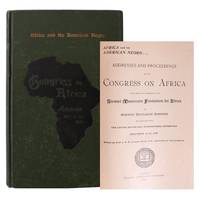1858 · Mostly Louisville, Kentucky and Philadelphia
by Gross, Louisa Elizabeth
Mostly Louisville, Kentucky and Philadelphia: Gross, Louisa Elizabeth, 1858. Good. 12” x 9”. String-gathered, thin paper album. Pp. [70] with 192 letters, clippings, calling cards, pressed flowers and other items of ephemera adhesive mounted and laid in and the last 50 pages are blank. Good: first two quires detached; moderate edge wear and chipping and susceptible to more; many items wholly or partially loose from adhesive; scattered spotting and a few small stains.
This is a bountiful scrapbook that primarily documents the rich social life of a quite talented and admired young woman, Louisa Elizabeth Gross. “Lou” was the daughter of eminent (truncated)
This is a bountiful scrapbook that primarily documents the rich social life of a quite talented and admired young woman, Louisa Elizabeth Gross. “Lou” was the daughter of eminent (truncated)








![Souvenir. 1901-'02. The City of... Houston, Texas [Cover title]](https://d3525k1ryd2155.cloudfront.net/h/073/604/1693604073.0.m.jpg)
